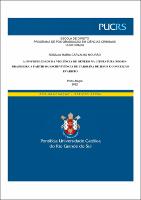| Share record |


|
Please use this identifier to cite or link to this item:
https://tede2.pucrs.br/tede2/handle/tede/10660| Document type: | Tese |
| Title: | A (in)visibilidade da violência de gênero na literatura negrobrasileira a partir da escrevivência de Carolina de Jesus e Conceição Evaristo |
| Author: | Mourão, Rosália Maria Carvalho  |
| Advisor: | Amaral, Augusto Jobim do |
| First advisor-co: | Söhngen, Clarice Beatriz da Costa |
| Abstract (native): | A presente tese tem por objetivo analisar a (In)visibilidade da violência de gênero na literatura negro-brasileira a partir da escrevivência de “Quarto de despejo”, de Carolina de Jesus e “Becos da Memória”, de Conceição Evaristo relacionando-a com a interseccionalidade de gênero, raça e classe. A pesquisa adequa-se a linha de pesquisa Violência, Crime e Segurança Pública por realizar um estudo interdisciplinar da violência de gênero a partir da Literatura. A natureza da pesquisa é de natureza qualitativa, caracterizada como análise crítica precedida de revisão bibliográfica, estruturando-se a partir da escrevivência das autoras a partir da abordagem interseccional de gênero, raça e classe. Os conceitos dos diversos tipos de violência, de gênero, sororidade e dororidade são explicitados para auxiliar na análise das obras. Na literatura canônica a participação feminina é mínima, a predominância é de homens brancos como: Jorge Amado, Lev Tolstói e Shakespeare que discutem a violência de gênero sob o viés de que a vítima tem culpa pela violência que sofre seja ela física, patrimonial, sexual ou psicológica. Em contrapartida, as autoras negras Carolina de Jesus e Conceição Evaristo através de sua escrevivência relatam experiências como moradores da favela em que a violência é interseccional, pois o gênero, a raça e a classe interferem na violação aos direitos humanos das mulheres negras. Estas sofrem a discriminação por serem mulheres, sejam como autoras da literatura brasileira, que não conseguem fazer parte do cânone literário, seja as personagens femininas de suas obras que tem seus direitos fundamentais violados. Mulheres negras sofrem racismo e seus corpos são expostos como se fossem mercadorias a serem expostas aos olhares ávidos dos homens que a querem consumir, como os antigos senhores faziam na época da escravidão. Além da questão sexual, as mulheres negras trabalham em empregos mal remunerados, que as colocam numa situação de subalternidade perante a branquitude como podemos perceber nas obras. A discriminação de classe dá-se com a exposição do favelada ou ex-favelada quando apresentam a escritora Carolina de Jesus. |
| Abstract (english): | This thesis aims to analyze the (In)visibility of gender violence in black-Brazilian literature from the writing of “Quarto de despejo”, by Carolina de Jesus and “Alleys of Memory”, by Conceição Evaristo, relating it to the intersectionality of gender, race, and class. The research fits the line of research Violence, Crime and Public Security for carrying out an interdisciplinary study of gender violence from the Literature. This is a research of qualitative nature, characterized as a critical analysis preceded by a bibliographical review, structured from the writing of the authors from the intersectional approach of gender, race and class. The concepts of different types of violence, gender, sorority and pain are explained to help in the analysis of the works. In canonical literature female participation is minimal, the predominance is of white men such as: Jorge Amado, Lev Tolstói and Shakespeare who discuss gender violence under the bias that the victim is to blame for the violence he suffers, be it physical, patrimonial, sexual or psychological. On the other hand, the black authors Carolina de Jesus and Conceição Evaristo, through their writing, report experiences as residents of the favela in which violence is intersectional, as gender, race and class interfere with the violation of the human rights of black women. Such women suffer discrimination because they are women, either as authors of Brazilian literature, who cannot be part of the literary canon, or as female characters in their works whose fundamental rights are violated. Black women suffer racism and their bodies are exposed as if they were merchandise to be exposed to the avid gazes of men who want to consume them, as the old masters did during the time of slavery. In addition to the sexual issue, black women work in poorly paid jobs, which place them in a situation of subalternity in the face of whiteness, as we can see in the works. Class discrimination occurs with the exposition of the favelada or former favelada when they present the writer Carolina de Jesus. |
| Keywords: | Carolina de Jesus Conceição Evaristo Escrevivência Violência de gênero Interseccionalidade Carolina de Jesus Conceição Evaristo Writing experience Gender violence Intersectionality |
| CNPQ Knowledge Areas: | CIENCIAS SOCIAIS APLICADAS::DIREITO |
| Language: | por |
| Country: | Brasil |
| Publisher: | Pontifícia Universidade Católica do Rio Grande do Sul |
| Institution Acronym: | PUCRS |
| Department: | Escola de Direito |
| Program: | Programa de Pós-Graduação em Ciências Criminais |
| Access type: | Acesso Aberto |
| Fulltext access restriction: | Trabalho será publicado como artigo ou livro |
| Time to release fulltext: | 24 meses |
| Date to release fulltext: | 20/03/2025 |
| URI: | https://tede2.pucrs.br/tede2/handle/tede/10660 |
| Issue Date: | 17-Oct-2022 |
| Appears in Collections: | Programa de Pós-Graduação em Ciências Criminais |
Files in This Item:
| File | Description | Size | Format | |
|---|---|---|---|---|
| TES_ROSÁLIA_MARIA_CARVALHO_MOURÃO_COMPLETO.pdf | ROSÁLIA_MARIA_CARVALHO_MOURÃO_TES | 1.41 MB | Adobe PDF |  Download/Open Preview |
Items in DSpace are protected by copyright, with all rights reserved, unless otherwise indicated.




